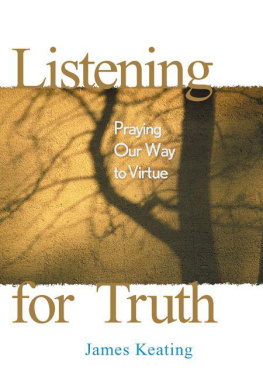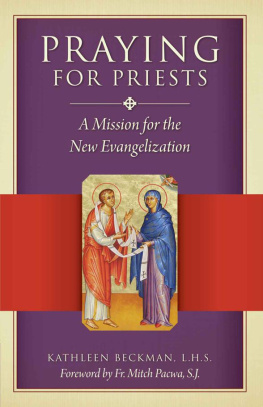James Keating - Spiritual Fathers: A Workbook for Priests and Dads
Here you can read online James Keating - Spiritual Fathers: A Workbook for Priests and Dads full text of the book (entire story) in english for free. Download pdf and epub, get meaning, cover and reviews about this ebook. year: 2010, publisher: Institute For Priestly Formation, genre: Home and family. Description of the work, (preface) as well as reviews are available. Best literature library LitArk.com created for fans of good reading and offers a wide selection of genres:
Romance novel
Science fiction
Adventure
Detective
Science
History
Home and family
Prose
Art
Politics
Computer
Non-fiction
Religion
Business
Children
Humor
Choose a favorite category and find really read worthwhile books. Enjoy immersion in the world of imagination, feel the emotions of the characters or learn something new for yourself, make an fascinating discovery.

- Book:Spiritual Fathers: A Workbook for Priests and Dads
- Author:
- Publisher:Institute For Priestly Formation
- Genre:
- Year:2010
- Rating:3 / 5
- Favourites:Add to favourites
- Your mark:
- 60
- 1
- 2
- 3
- 4
- 5
Spiritual Fathers: A Workbook for Priests and Dads: summary, description and annotation
We offer to read an annotation, description, summary or preface (depends on what the author of the book "Spiritual Fathers: A Workbook for Priests and Dads" wrote himself). If you haven't found the necessary information about the book — write in the comments, we will try to find it.
Spiritual Fathers: A Workbook for Priests and Dads — read online for free the complete book (whole text) full work
Below is the text of the book, divided by pages. System saving the place of the last page read, allows you to conveniently read the book "Spiritual Fathers: A Workbook for Priests and Dads" online for free, without having to search again every time where you left off. Put a bookmark, and you can go to the page where you finished reading at any time.
Font size:
Interval:
Bookmark:

NIHIL OBSTAT | Father Joseph C. Taphorn, JCL |
IMPRIMATUR: | Most Reverend George J. Lucas |
THE INSTITUTE FOR PRIESTLY FORMATION
IPF Publications
2500 California Plaza
Omaha, Nebraska 68178
www.IPFPublications.com
Copyright August 28, 2010 by
The Institute for Priestly Formation, Inc.
All Rights Reserved. No part of this book may be reproduced, stored in a retrieval system, or transmitted by any means, electronic, mechanical, photocopying, recording, or otherwise, without the written permission of The Institute for Priestly Formation.
Printed in the United States of America
ISBN-13: 978-0-9843792-1-7
ISBN-10: 0-9843792-1-5
Scripture texts are taken from the New American Bible with Revised New Testament 1986, 1970 Confraternity of Christian Doctrine, Washington, D.C. and are used by permission of the copyright owner. All Rights Reserved. No part of the New American Bible may be reproduced in any form without permission in writing from the copyright owner.
Cover design by FAITH Catholic Publishing and Communications
Lansing, Michigan
THE INSTITUTE FOR PRIESTLY FORMATION
Mission Statement

The Institute for Priestly Formation was founded to assist bishops in the spiritual formation of diocesan seminarians and priests in the Roman Catholic Church. The Institute responds to the need to foster spiritual formation as the integrating and governing principle of all aspects for priestly formation. Inspired by the biblical-evangelical spirituality of Ignatius Loyola, this spiritual formation has its goal the cultivation of a deep interior communion with Christ; from such communion, the priest shares in Christ's own pastoral charity. In carrying out its mission, the Institute directly serves diocesan seminarians and priests as well as those who are responsible for diocesan priestly formation.
THE INSTITUTE FOR PRIESTLY FORMATION
Creighton University
2500 California Plaza
Omaha, Nebraska 68178
A WORKBOOK FOR PRIESTS AND DADS
EDITOR: | Deacon James Keating, PhD |
CONTRIBUTORS: | Edward Hogan, PhD |


Together, the father and the priest can meet an urgent need in the family and Church today: presenting the spiritual life as a true journey to personal happiness. In many boys' minds, worship, prayer, and service to others is the way of women. This error in judgment is often born in boys because their fathers are absent in the home as initiators of prayer and instructors in the moral life. This error is further compounded by the absence of priests in the lives of young men.
This lack of masculine role-modeling in the spiritual life results in boys being ignorant of the true nature and adventure of entering the spiritual life and guiding others to do so as well. Consequently, boys are not able to relate to who a priest is and what a priest does. Certainly, no normal boy wants to give up wife and family to do "office work" all day or to attend to the needs of the elderly who frequent daily Mass. Looking from afar, many boys think that these mundane and ritualistic tasks exhaust who a priest is and what a priest does. The young boy or teenager is looking for an adventure, a journey; therefore, the priest must show both men and their sons that the deepest, most engaging part of priesthood lies beneath mere appearances. Those priests and fathers who are courageous enough to enter a life of prayer will find that many young men will follow them. As always, the boy is looking to explore, discover, and see new things. These desires are satisfied fully only in a deep living relationship with God. The best people to introduce this adventure to the boy are his spiritual fathers, the men who already have explored and now enjoy the spiritual life: his dad and his pastor.
If priests and fathers work together to form a life of prayer within a boy's heart, priestly vocations will flow naturally from the family. Additionally, those sons not called to the priesthood will become a generation of fathers who love the spiritual life. Either way, the call to holiness in men will deepen, thus securing hope that Christ will come to possess the heart, mind, and soul of future priests and dads.
This workbook should be used by men as a catalyst to begin or deepen their spiritual life with the expressed desire of sharing this life with their sons. The contributors to this book envision it being used in meetings between fathers and priests. Within these meetings, the content of this workbook should be shared and reflected upon, especially the stories written by priests about their own fathers. Such stories will clarify how a father ministers the mystery of faith to his sons. The following format may be followed in the meetings:
Opening Prayer:
Participants should begin by placing themselves in the presence of God. (God is always present to us, but we are not always present to God.) They should ask for the Holy Spirit's help in making them aware of God's presence in their lives.
As participants become aware of God's presence to them, they should let that awareness give rise to gratitude and thanksgiving for the gift of His presence.
Once participants are grounded in awareness of and gratitude for God's presence, they should think about their daily lives. Where has God been present to them? Where have they recognized God's presence and allowed Him into their lives? Where have they refused to receive God's presence or not allowed Him into their lives?
As participants recognize times when they have let God into their lives, they should express their gratitude for His gifts. As they recognize times when they did not let God into their lives, they should express their sorrow.
Participants should continue in their conversation with God by speaking to Him about any significant thoughts, feelings, or desires. They should notice their feelings of fear, joy, longing, grief, or sorrow and in their imagination, place those feelings into Christ's Heart or share those feelings with Him at the foot of His cross.
Participants should make a firm resolution to respond to Christ's love for them and resolve to keep all of the contents of their heart and mind in His light.
At the end of prayer:
Participants should read one chapter or a portion of a chapter or witness essay in this workbook. They should move through the sections and the questions at their own pace. The content of the workbook is to evoke conversation, silence, and prayer. The book is meant to move the participants to a new commitment to fathering and is not meant to be read as a textbook.
The leader will invite participants into silent reflection.
The leader will then lead a discussion about what moved the participants' thoughts and feelings.
Next pageFont size:
Interval:
Bookmark:
Similar books «Spiritual Fathers: A Workbook for Priests and Dads»
Look at similar books to Spiritual Fathers: A Workbook for Priests and Dads. We have selected literature similar in name and meaning in the hope of providing readers with more options to find new, interesting, not yet read works.
Discussion, reviews of the book Spiritual Fathers: A Workbook for Priests and Dads and just readers' own opinions. Leave your comments, write what you think about the work, its meaning or the main characters. Specify what exactly you liked and what you didn't like, and why you think so.








